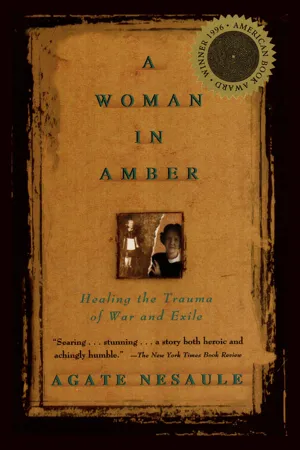![]()
Part I
![]()
1
Talking in Bed
We are talking in bed, friends again instead of lovers. Apricot-colored fern fronds wave against the pearl gray background of my flannel sheets. Both of us are surprised to hear thunder, thunder in February, in Wisconsin, over frozen ground and dirty snow. My hand rests lightly on his gray hair, our legs are still entwined. Soon we will turn away from each other, but our backs will touch, close enough to stay warm. We will dream different dreams. He will walk in the Sangre de Cristo mountains of New Mexico or drive over a wooded Wisconsin road towards Birch Island Lake. I will carry a baby away from a burning Latvian village, evade Nazi guards, catch the last train. When we dream about being seven, we speak different languages.
“Tell me a story,” John says, “tell me a story before we go to sleep.”
I can’t think of one. I have told him many stories, but during the day I often feel we are strangers. I don’t believe him when he says he loves me, I don’t expect him until he returns.
“You first,” I say.
“I told one last night.” And it’s true, he has. A Miss McPike, the choir director, has glared at two altar boys in Spooner, the small Wisconsin town where John grew up.
“I can’t think of one, they’re all gone. Or rather, I’ve told them all.”
“Did you have a car in Latvia, before the war?” he prompts.
That’s all I need, I am off. “No, no cars, just horses. And, of course, bicycles.”
The Parsonage seemed immense. A long road wound through the park toward the trellised porch. Mock orange and lilacs bloomed close to the house; I remember the fragrance. In the fall the leaves from the tall gloomy oaks and red maples were strung on wire. Later, six or so at a time they would be placed under the unbaked loaves of sweet and sour rye bread. Sometimes there was a pattern of leaves on the bottom crust.
My mother had a new bicycle. It was shiny metal, with a large black leather seat and huge black handlebars. But it wasn’t like a man’s. It had blue and green and red crocheted skirt-guards and a round silver bell.
It was before the war got very close, I am sure of that. She would not have had time to learn to ride a bicycle once refugees and partisans started coming to the house. Gypsies came too. So did a lot of relatives. The adults sat up late and argued whether to sail to Sweden, stay in Latvia, go to Germany. No one cared if my sister and I stayed outside all night, no one made us go to bed. We fell asleep under the stars, sometimes we slept in the hay. But this was the year before the war came. I must have been five, my sister six.
My mother walked the bicycle by herself on the gravel path by the orchard. The apple trees had already finished blooming, but the tiny green fruit could hardly be called apples yet. She would run a little, try to mount, change her mind and slow down again. My sister, Beate, and I were holding hands, watching. My mother had told us to stay behind the orchard fence, well out of her way.
Sniegs walks out of the house, he is smoking a cigarette. His eyes are a washed-out blue. He is dressed in an immaculate suit, but he is wearing bedroom slippers. When he gets closer we can see that one of his shirt cuffs is unbuttoned and the sleeve is frayed. Once he was a promising concert pianist, but now he plays the organ in our father’s churches. My father says that Sniegs has ruined his life; he has failed to live up to his earlier promise and taken to drink.
On Sunday mornings Sniegs lets my sister and me pump the organ. Perspiring and trembling after a dissipated night, he is nevertheless vigorous as he plays the hopeful Lutheran hymns. We love being up in the loft with him. It is better than sitting still in one of the pews, waiting for the sermon to be over.
Inhaling slowly, Sniegs watches my mother through narrowed eyes. She is wearing a linen blouse, trimmed with lace, and a full blue skirt that swings as she moves. Although it is summer, she is wearing magenta stockings and black shoes with delicate straps. The shoes are dusty, her face is flushed. She looks up at him, holds his gaze for a second or two, then drops her eyes.
Sniegs strides across the open expanse of lawn bordered by daylilies and irises. He swings across the fence rather than using the gate and stands very close to her. He says something so quietly that we cannot hear, and she laughs. He whispers again, and she laughs once more. Then he steadies the seat with one hand and blows out a final puff of smoke over her shoulders, vulnerable beneath lace and linen. We know she is wearing an ivory-colored camisole; the outline of a smooth satin strap is faintly visible beneath the chaste cool cloth. He grinds the cigarette into the gravel with his heel and puts his other hand on the handlebar. She seems to shiver slightly as she puts her feet on the first pedal, then the second. He soothes and steadies while she, protected by his arms, pedals clumsily at first, then confidently.
She does not look at us. I can feel my face flushing. Beate and I hold hands, our arms stiffly extended. We are trembling with rage. My sister brushes hair out of her eyes to see better.
My mother, shielded by Sniegs, has circled the orchard path a dozen times. She glances at him now and then, but she does not look at us. She has forgotten we exi...
